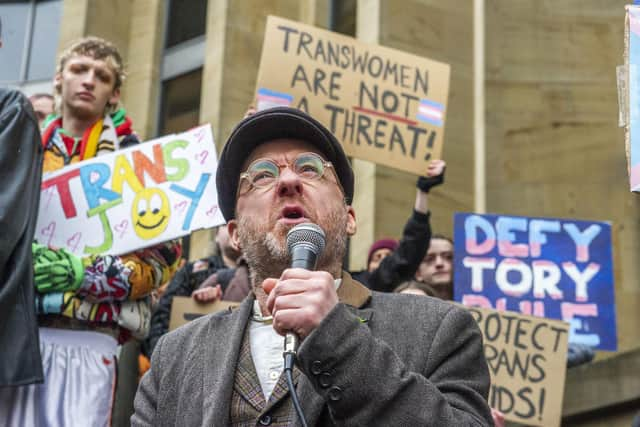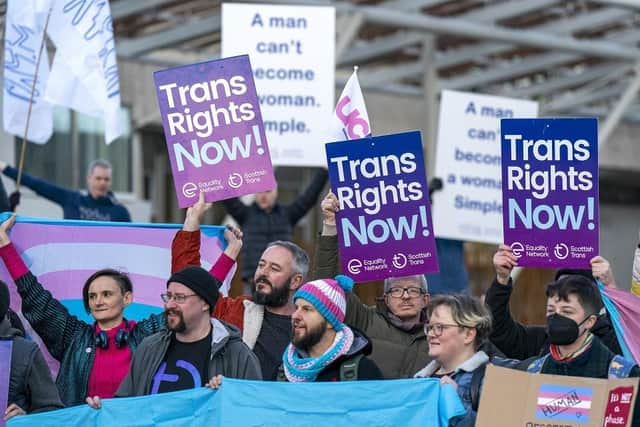Gender Recognition Reform Bill: Why the section 35 order is a seminal moment in devolution's history
It is worth reflecting on that fact when considering and assessing the decision by the UK Government to block the Gender Recognition Reform Act passed by the Scottish Parliament just before Christmas.
Strip back the shouting, the anger and the fury, and that is the central fact. It has never before happened.
Advertisement
Hide AdAdvertisement
Hide AdBritish devolution to the nations, by the standards of democratic institutions, is young and immature. It is less than 25 years old. On many issues this means its founding principles have never been tested.
This is what makes the use of section 35 of the Scotland Act such a historic moment in the history of devolution.
The merits of the case put forward by the UK Government and Scottish secretary Alister Jack are unknowable, at least to this point. Any claiming certainty on what a court and critically the Supreme Court – as that is where this dispute is heading – will rule should be ignored.
This is the case, not just because of the lack of a court ruling at this point, but due to the vacuum of understanding of how section 35 works in practice. Academic readings and interpretations aside, a court has never ruled on its use. There is no case law, no guide to legislators or lawyers, just the legislation.
Lawyers and academics who have commented have a split opinion. Lord Hope, the first Deputy President of the Supreme Court, said he believes the UK Government’s statement of reasons are devastating for the Scottish Government.


Lord Falconer, the former Lord Chancellor and justice secretary under former prime minister Tony Blair, said he believes the “nuclear option” has been used in what he calls a “minor skirmish”.
Devolution is not averse to Holyrood Bills impacting the operation of UK-wide law.
Section 104 orders, whereby changes are made to acts of Parliament after Bills have passed to help tackle cross-border issues, have been used in the past. Examples include the Bankruptcy (Scotland) Act 2016 and The Victims and Witnesses (Scotland) Act 2014.
Advertisement
Hide AdAdvertisement
Hide AdThe option for the UK Government to go down a different road was there. Section 35 was neither inevitable nor necessary, but that does not mean it also was not reasonable – the key test the UK Government will have to meet.


There is a degree of confidence from the Scottish Government, which believes it will have a strong case – though it is not clear whether legal advice has yet been received from the Lord Advocate on the prospects of success.
Pushing the UK Government on the question of “reasonable grounds” will be the likely line of attack, but as there is no case law much will depend on the judges’ interpretation of the act. The view is the decision to block the Bill is due to policy differences dressed up in legal argument by section 35.
What is clear is there was a complete failure of communication between the UK and the Scottish governments on the issue, but to what extent that was deliberate to force a constitutional stooshie is unclear.
However, Scottish Government sources said they were unimpressed by Kemi Badenoch, the UK minister for women and equalities, when the long-awaited meeting between the two governments took place last year.
From the Scottish Conservative side of the fence, there are mixed feelings about the strategy.
Publicly, the party is adamant this was necessary and legitimate. The use of section 35, they argue, is a key pillar of devolution settlement. It is not, as First Minister Nicola Sturgeon would like the public to believe, a unilateral veto power that was intended never to be used.
Others in private question the benefit of pushing the very loud and public row around gender recognition within Holyrood into the wider political sphere.
Advertisement
Hide AdAdvertisement
Hide AdOne MSP airing his concerns questioned what votes were available as part of this to their party. Some are simply unconvinced there are many people beyond the political bubble who care about the issue and will shift their votes on the back of the stance taken by the UK Government.
Scottish Labour are in a tougher bind. Stuck between evident and obvious policy differences north and south of the border, there is an indication the party would rather talk about anything else other than gender recognition.
Scottish Labour leader Anas Sarwar has publicly stated section 35 was the wrong move, but his party in Westminster wants to see the legal advice provided to Alister Jack before commenting. There is a fear of alienating the red wall and more conservative voters over culture war wedge issues.
In Scotland, that is a risk Sarwar cannot take if he wants to win votes from the SNP.
A senior source within the party described the use of section 35 as a “test moment for devolution”. “We can't pretend it isn't part of the devo settlement and that it was voted for by all of the parties in this Parliament,” they said.
“We do not believe it is currently been used in good faith and we don't think the necessary steps have been taken to justify the use of the order.
“When ministers brought it through the Parliament, they issued an memorandum of understanding in 1999 that section 35 was to be used as the device of last resort and we fundamentally believe that hasn't been the case.
“But, we also haven't seen the evidence that the SNP ministers tried constructively to avoid this situation either. Trans people are currently the victims of almost two decades of governments refusing to engage with each other.”
Advertisement
Hide AdAdvertisement
Hide AdThe eventual court cases – most likely to take place in both the Court of Session and the Supreme Court – will set crucial precedent on the boundaries of the existing devolution settlement, whichever of the two governments succeed in front of the judges.
The judgements will define how far governments can go when they disagree and the true powers available to Holyrood. It is a seminal moment for devolution.
Want to hear more from The Scotsman's politics team? Check out the latest episode of our political podcast, The Steamie.
It's available wherever you get your podcasts, including Apple Podcasts and Spotify.
Comments
Want to join the conversation? Please or to comment on this article.
